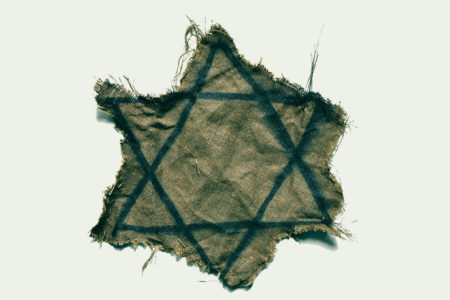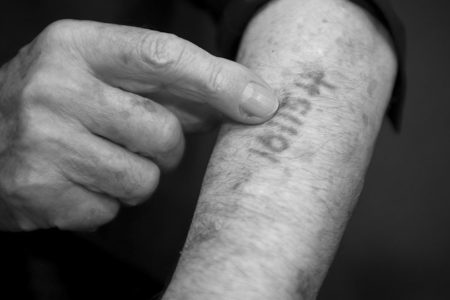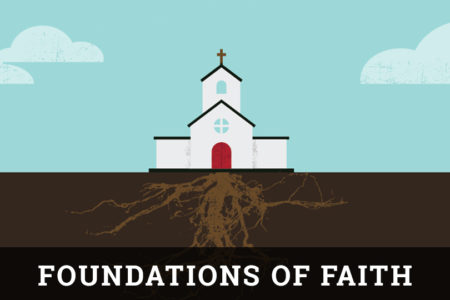Holocaust: A Christian Atrocity?
And so I believe today that my conduct is in accordance with the will of the Almighty creator. In standing guard against the Jew I am defending the handiwork of the Lord (Adolf Hitler, August 13, 1920).
That Adolf Hitler has been perceived by some as he promoted himself—a defender of “the handiwork of the Lord”—stands as one of history’s consummate tragedies. For Jewish people, the long road of “Christian” persecution of their forefathers was but a tortuous climb toward the pinnacle reached when Hitler proclaimed the infamous “final solution.” With the extermination of six million Jews within the very bastions of European Christian enlightenment came the all but universal “case closed” attitude of Jewry toward their Christian counterparts.
The memory of the Holocaust remains such a painful episode that it is almost impossible to begin to assimilate the immensity of cruelty and suffering endured by Hitler’s victims. Perhaps this is why revisionist historians—those who deny that the Holocaust ever happened—are receiving an audience for their preposterous and dangerous distortions. As long as there remains among us a host of Jewish elders who bear on their arms the faded blue numbers from the death camps, the world will have a witness. But when they, and those who were eyewitnesses to their agony, are gone, we can anticipate a torrent of denial from anti-Semites and those with no stomach for this historical reality.
Consequently, now is the time for Jewish people and Christians who know the facts to set the record straight and produce new volumes of irrefutable information, figures, and graphic memorials to that which we can ill afford to forget. To forget would most certainly will to the next generation the awful prospect of causing history to repeat itself.
A Religion of Politics
Basic to setting the record straight (that is, correcting entrenched misperceptions) is making it understood that the Holocaust was not an inherently “Christian” phenomenon. I, for one, am convinced that when the nature and course of the Holocaust are clearly understood, the roots of all anti-Semitism are laid bare and can therefore be objectively reckoned with. Furthermore, when the failures and myths are exposed and dispelled, Jews and evangelical Christians can forge a factual base for understanding that will constructively serve both communities in the future.
To say that Adolf Hitler, born a Roman Catholic, hated Jews is possibly the greatest understatement in the history of humanity. The flame of hatred ignited in his youth turned white-hot as he mastered Germany and began to forge his “Master Race.” In his final days, hunkered down in his bunker with Berlin burning around him, the dictator still ranted against Jewry. So deeply did Hitler despise the children of Abraham that he wrote them into his will. “Above all,” he instructed, “I enjoin the leaders of the nation and those under them to uphold racial laws to their full extent and to expose mercilessly the universal poisoner of all peoples, international Jewry.” So absolute was his demented contempt for the Jewish people that he believed, should Jews gain control of the political systems of the world, the planet would be denuded of human beings. “Should the Jew,” Hitler said, “triumph over the people of this world, his crown will be the funeral wreath of mankind, and the planet will once again follow its orbit through the ether, without any human life on its surface, as it did millions of years ago.”
Personal hatred for a race of people, as lamentable as it may be, is one tragedy. It is quite another to systematize such vehemence as a political weapon that feeds ingrained prejudices while diverting inquisitive eyes from the true objectives of the regime. The sound and fury of the onslaught of the Nazi “scapegoat the Jew” campaign fueled nationalistic passions and caused most in an incredulous nation to stand idly by as Europe became a slaughterhouse for Jews. There must, the future Fuehrer raved in a Munich beer hall cellar in 1920, be a new slogan, one not restricted to Germany alone: “Anti-Semites of the world unite. People of Europe, free yourselves.” He also called for what he termed a “thorough solution … the removal of the Jews from the midst of our people.” We ponder how such a program of political genocide could be launched without the general population knowing what was happening. The answer cannot be that the country did not understand what Hitler intended to do. William H. Shirer, in his book The Rise and Fall of the Third Reich, makes the point: “For whatever accusations can be made against Adolf Hitler, no one can accuse him of not putting down in writing exactly the kind of Germany he intended to make if he ever came to power and the kind of world he meant to create by armed German conquest.”
The state the Fuehrer meant to create was not a Christian utopia. As a matter of fact, Hitler and his Nazi goons were anything but Christian. The “Christian” perception stems from the fact that Hitler successfully exploited a strain of anti-Semitic tendencies that were, unfortunately, fixed in the minds of various segments of the Catholic and Protestant communities in Germany. Considering the devastating attacks on the Bible and biblically orthodox Christianity brought by liberal theologians and their secular-humanist counterparts, it is little wonder that many nominally religious Germans were less than incensed at events taking place about them. Also, the relentless Nazi anti-Jewish propaganda, coupled with the early political and military triumphs of the Third Reich, conditioned much of the community to the point that what was happening to their Jewish neighbors didn’t seem to be a major concern. Furthermore, the fact that the Vatican and major Protestant denominations were neutralized until it was much too late to make a difference will, for time immemorial, stand in stark contradiction to everything Christ and His church truly represent.
“Lords of the Earth”
The Third Reich’s brand of religion was designed to destroy and then replace what might be termed conventional Christianity. This was amply illustrated in Hitler’s relationship with a man named Houston Stewart Chamberlain, a nephew of England’s Sir Neville Chamberlain. It was commonly said that H. S. Chamberlain was the spiritual founder of the Third Reich. He was a man who saw Germans as the master race and their leader as a man sent from God to lead the German people out of the wilderness. Chamberlain’s theological views were, to say the least, strange. “Whoever claimed,” he said, “that Jesus was a Jew was either being stupid or telling a lie … Jesus was not a Jew.” When asked “Who, then, was Jesus?” he replied, “Probably an Aryan! If not entirely by blood, then unmistakably by reason of his moral and religious teaching.” Chamberlain went so far as to propose that the important personalities in Jewish history, such as David and the prophets, were of Germanic descent.
The Germanic obsession with racial superiority, breeding, and populating the planet with racially pure “Lords of the Earth” called for the birth of a new religion. Adolf Hitler, who frequently used the term “Lords of the Earth” in Mein Kampf, saw himself as the perfect Caesar-god.
By the late 1930s, it was clear that the Nazis intended to destroy Christianity in Germany. Martin Bormann and Heinrich Himmler, encouraged by Hitler, promoted a return to the old paganism of the early tribal Germanic gods and a brand of neo-paganism created by Nazi fanatics. In 1941, Bormann stated publicly that “National Socialism and Christianity are irreconcilable.”
Bormann and his goose-stepping peers were not alone in their extremism. Dr. Reinhardt Krause, the Berlin district leader of the “German Christians,” proposed the abandonment of the Old Testament. He further championed a revision of the New Testament in which the teachings of Jesus would be made to correspond “entirely with the demands of National Socialism.” Hitler’s “German Church” heard resolutions calling for “One People, One Reich, One Faith.” Compliant pastors were required to take an oath of allegiance to the Fuehrer and, among other things, exclude converted Jews from their churches.
Dr. Hans Kerrl, a Nazi lawyer, was appointed Minister of Church Affairs in 1935. Kerrl’s task was to reconcile Protestants with the master program for the “German Church.” Indeed, his view of Christianity provides a window to the very soul of National Socialism. “The [Nazi] party stands,” Kerrl said, “on the basis of positive Christianity, and positive Christianity is National Socialism … National Socialism is the doing of God’s will … God’s will reveals itself in German blood … Faith in Christ as the Son of God. That makes me laugh … No, Christianity is not dependent on the Apostle’s Creed … True Christianity is represented by the party, and the German people are now called by the party and especially by the Fuehrer to a real Christianity … the Fuehrer is the herald of a new revelation.”
Portions of Hitler’s “new revelation” for Germany were set forth in a 30-point program drawn up by the “National Reich Church.” Two of the program’s points get to the heart of the issues between the Nazi regime and true Christianity. “The National Church demands immediate cessation of the publishing and dissemination of the Bible in Germany” (13). “On the altars there must be nothing but Mein Kampf (to the German nation and therefore to God the most sacred book) and to the left of the altar a sword” (19).
To Hitler and his diabolical cronies, the National Reich Church was the perfected Religion of Politics that was destined to serve the “Lords of the Earth” throughout the glorious millennium envisioned for the Third Reich.
The Evangelical Thorn in the Nazi Side
From the beginning, however, there were those Christians—a minority, to be sure—who said no to religious hand-holding with swastika-wielding emissaries of the Devil. With names like “The Confessional Church,” “The Pastor’s Emergency League,” and “The Evangelical Church of Germany,” some stood against the new wave of nationally enshrined paganism.
Such groups resolutely reaffirmed their belief in the Word of God as their only rule of faith and practice. As early as 1933, a group of pastors met to formulate a declaration stating that the church was called into existence by God, with Christ as its living power. The declaration set forth that the state is ordained by God to curb mankind’s sinful passions; no specific form of the state is Christian; Christians should obey God, not man; and when the state seeks to dominate the consciences of men, it has become anti-Christian. Also, when political parties assume the form of religion, they do violence to the state. Christians, therefore, are obligated to resist both the deification of the state and any party seeking absolute control over the individual.
The Pastor’s Emergency League, made up largely of younger men, responded forcefully to what they regarded as the heathen theology of the German Church. “We refuse,” they affirmed, “to earn the reproach of being dumb dogs. We owe it to our congregations and to the Church to resist the falsification of the Gospel. We emphatically recognize the Holy Scripture of the Old and New Testaments as the unique test of our faith and life.” Such commitment to biblical principles spawned acts of courageous opposition to the persecution of the Jewish people and other atrocities brought about by the Nazis, such as state approved euthanasia.
Hitler’s reaction to upstart evangelicals who refused to bow the knee to their Caesar was emphatic. The Fuehrer insisted that if the Nazi-controlled German Church could not bring evangelical churches into line with their new religion, then the government itself would be obligated to take over direction of the churches.
The dictator’s idea of directing dissident churches was typical Nazi style. By the end of 1935, 700 Confessional Church pastors were arrested by the Gestapo. Hundreds more were forced to join them in the concentration camps in 1936. In 1937, 807 more pastors and leading laymen were picked up as subversives. Before the reign was over, thousands of evangelicals attested to the quality of their faith by choosing death over capitulation or life behind the barbed wire of the Nazi concentration camps. These people—mostly unknown and unheralded—march in the ranks of Righteous Gentiles who could not endure forsaking their Savior or His Jewish brethren.







